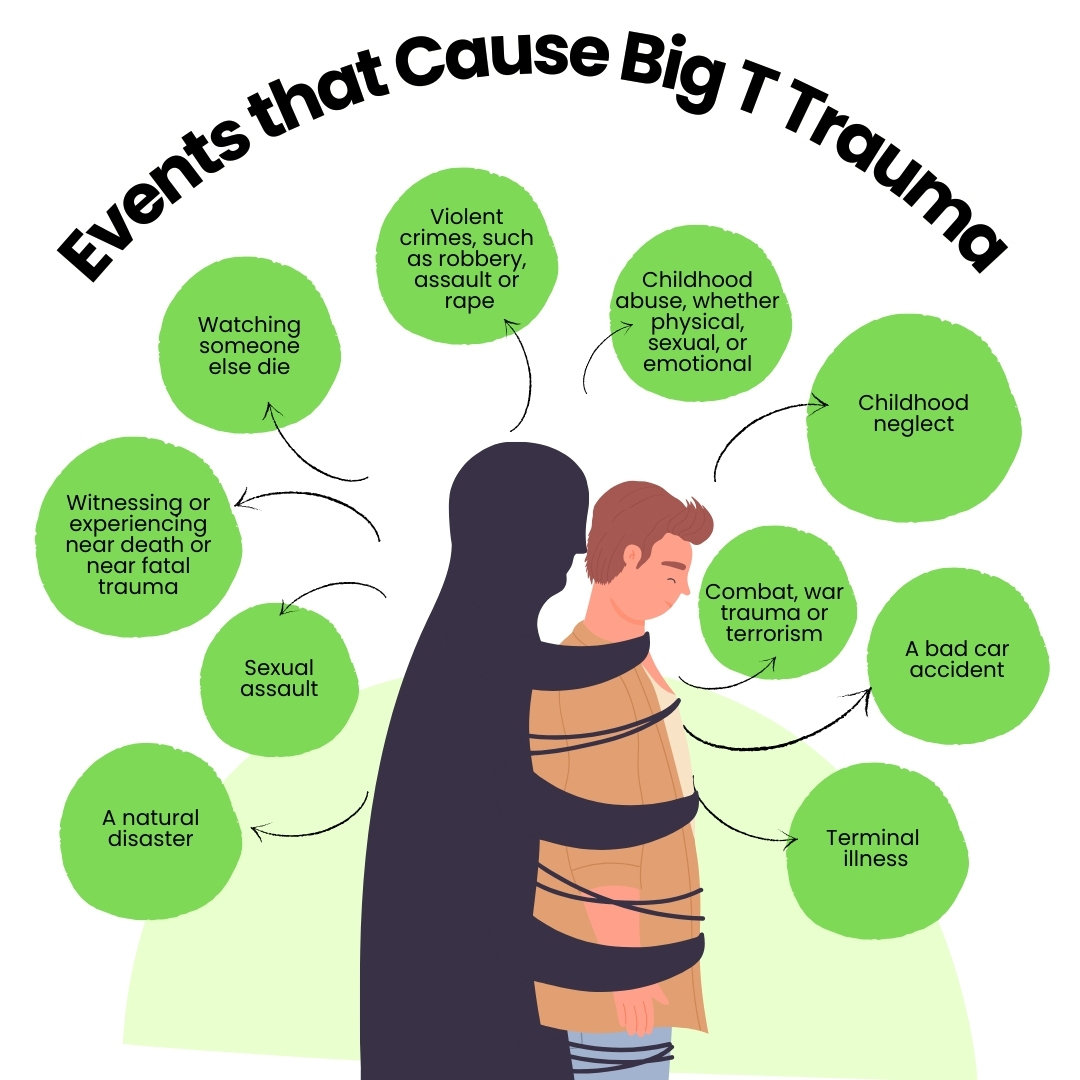

Certain events stay with you. If they’re positive events — like your wedding — they fill you with warmth and happiness. But if they’re traumatic events, they can scar you for years. Now you can overcome big T trauma, as the fallout from major traumatic events is called, through treatment at Online Psychiatrists, serving patients in New York, New Jersey and Florida. Call today to schedule an appointment.
Everyone likes to feel a sense of control. Events that make you feel out of control can be traumatic. Often, it’s not the event itself, but your experience of the event that drives the trauma. Sometimes, two people can experience the same event, but only one ends up traumatized from it. This isn’t a judgement; it’s a sign that many factors are involved.
Therapists and researchers often categorize trauma into several classifications:
Big T trauma refers to single, devastating events. These may involve unexpected large-scale events that make the news — such as the 9-11 attacks — or personal, small-scale shocks that you, your friends and family feel like a gut punch — as in the sudden death of a loved one.
★★★★★Very caring and direct provider who also has up-to-date knowledge on psychiatry and other medical fields. Going to him has been a pleasure and I've already recommended him to my co-worker. Dr. Ivanov is very approachable and I love that about him.
Experiencing these types of trauma can lead to ongoing and debilitating responses. As a result, almost every area of your life gets affected. Many people associate big T trauma with a response that produces post-traumatic stress disorder or PTSD-like symptoms. While that’s not completely incorrect, big T trauma affects individuals differently.
For any type of trauma, seek professional guidance with Online Psychiatrists. You must process it and find the best coping mechanisms to move forward. You can access expert psychiatric care from this practice if you:
Going through life sometimes leads to unexpected violence, illness or accidents. There are some events you just can’t prepare for and over which you have absolutely no control. These events may cause you to show symptoms of big T trauma. These events include:
Although you may go years without experiencing any of these events, if you’re like most people, you’ll have at least one big T trauma in your lifetime. Sometimes, the event doesn’t leave an emotional scar, but it often does. But help is available at Online Psychiatrists.

Studies show that your brain and your body register big T trauma events on a cellular level. This cellular recording then causes you to retrigger your negative thoughts, emotions and physical reactions whenever anything happens that reminds you of the big T trauma event, consciously or unconsciously. It’s as if you’re re-experiencing the traumatic event in the present. Noticeable symptoms include:
Harvard Certified
Nationally Recognized
Book AppointmentAs a survivor of big T trauma, you may feel frustrated. You can’t see any way to stop past events from impacting the present. There’s a sense of grief, knowing these events have changed you. Relationships often suffer. You may turn to alcohol, substance abuse, or other maladaptive behaviors to cope, requiring addiction treatment.
Each individual’s reaction to a trauma depends on several factors. Questions to ask yourself include:
Understanding your responses to these questions helps you feel a renewed sense of control. But there’s more you can do to strengthen yourself enough to encourage healing. For example, it may be easier to sit with strong emotions and scary thoughts in a therapist’s caring presence rather than alone, late at night. Having access to a trusted guide is one of the values of psychotherapy.

As with many upsetting events, you feel isolated and alone, as if you’re the only one who has experienced these upsetting and life-changing emotions. One of the most effective aspects of therapy is the normalization process. Knowing that your emotions and reactions are normal relieves you of worry and helps you regain a sense of control.
At Online Psychiatrists in NYC, you discuss the connections between your experience and your body’s response, as well as behaviors that both help and harm. Having symptoms of big T trauma or PTSD isn’t a sign of weakness. It’s merely the sum of your past experiences and belief system.
During and after trauma, it’s often hard to put things in perspective. These strong feelings and upsetting thoughts don’t have to be permanent. Contact the psychiatrists who help you process the traumatic events, understand their effects on your life, and find your new normal.

Dr. Zlatin Ivanov, MD, is an adult psychiatrist specializing in addiction treatment, ADHD, anxiety, depression, and OCD. He offers exceptional talk therapy and medication management through online video conferencing.
Dr. Ivanov is double board certified in Psychiatry and Clinical Neurology and a member of the American Psychiatric Association. His medical career is colored by many outstanding contributions to medicine, including several publications, research, and scientific presentations. An attending psychiatrist at Woodhull Medical Center in Brooklyn, NY, and Bellevue Hospital Center in New York City, he takes the time to listen to patients and makes sure they know he is committed to their unique situation.
 Our Locations
Our Locations
The Chrysler Building
405 Lexington Ave, #2601
New York, NY, 10174 (map)
300 Carnegie Center Drive #150K,
Princeton, NJ, 08540 (map)
701 Brickell Avenue, 1550#A,
Miami, FL, 33131 (map)